Coal tips safety team aims to avert another Aberfan disaster
- Published
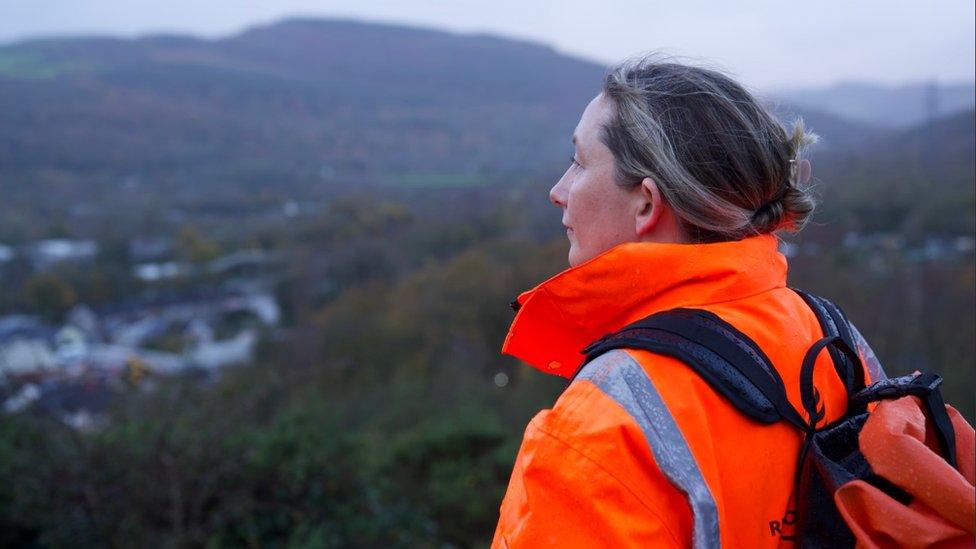
Beth says she has been aware of coal tips and the possible dangers all her life
The Aberfan disaster is always in the back of Beth Jones' mind.
Despite being born decades after the tragedy, the engineer is part of a new specialist team charged with preventing such an event from ever happening again.
Concerns over the threat from coal tips resurfaced in Wales in 2020, when storms caused a 60,000-tonne landslide at a disused site in Rhondda Cynon Taf.
The Welsh government said it had made £44m available for safety work.
Nobody was injured in the slip down the empty valley at Tylorstown, but after three years of analysis, the Welsh government has now published the locations of 350 higher risk coal tip sites.
Many sit on the hillsides above former mining communities and around 600 households are expected to receive letters this week telling them their property is on one of these tip sites.
Some will be finding out for the first time.
"As someone who has grown up in Aberdare, I have been aware of tips all of my life," said Beth, 41, who helps to lead the recently established Coal Tip Safety Team for Rhondda Cynon Taf council.
"None of us in our team live that far away from a coal tip, so they all directly impact us and our families."
She said the team wanted to "minimise the risk of any future disasters".
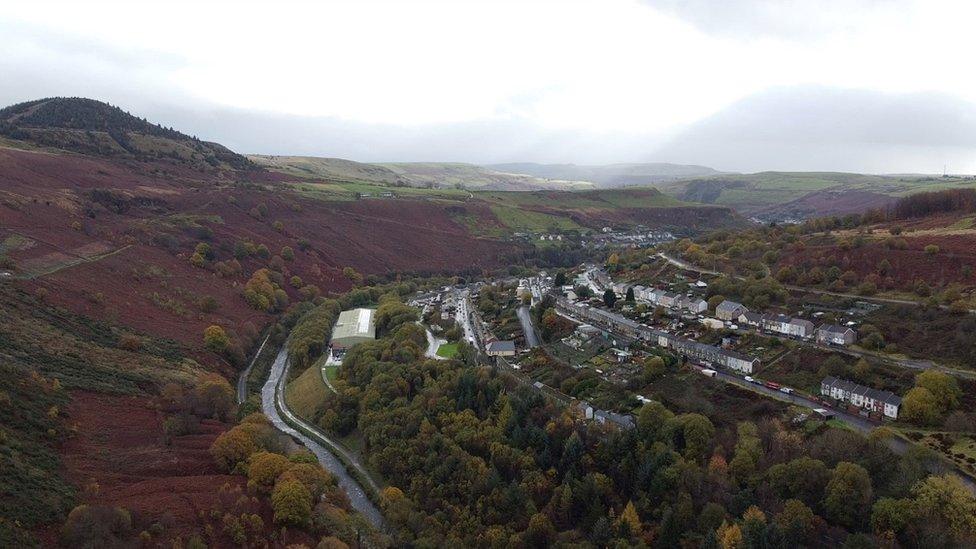
Coal mining once dominated the south Wales valleys
The principal tip engineer admits it has been a "steep learning curve" to get to grips with the sheer number of disused tips still remaining in south Wales.
Her local authority has almost twice the amount of the highest risk Category D tips than any other area - 29 in total.
The categories do not mean the tips are at an immediate risk of sliding, but that the consequences if they did so would be more severe, with some sitting in the proximity of homes, schools and hospitals.
In order to keep them safe, engineers like Beth have been working to create 3D maps of sites, where they can monitor every minute change, install motion detecting sensors, and use remote cameras to monitor drainage.
The highest risk tips in Rhondda Cynon Taf are also inspected in person by engineers every month.
"We start by always, always, always looking for the water," said Beth.
"It's almost always the water that starts any landslide off. So we always look for the water."
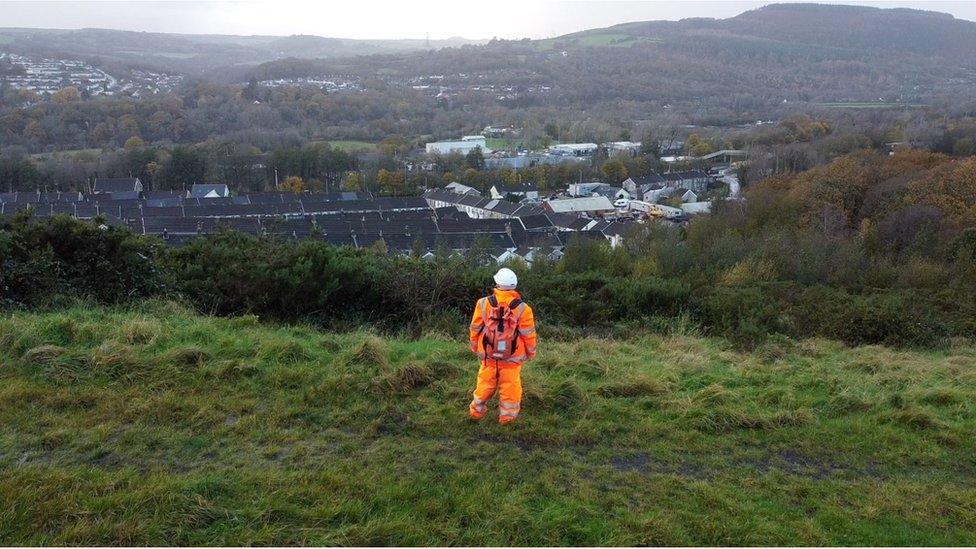
The new team will keep an eye over the Rhondda valleys
Installing drainage systems allows engineers to know that water is flowing away from the tip and down the valley.
"You're looking for cracks, bulging, changes in vegetation. There's lots of different markers that we look for when we're doing an inspection," said Beth.
"There are always little incidents on tips that don't amount to anything from a tip safety perspective, but you're always aware that it could grow into something else."
She said what happened in Aberfan was always in the back of the team's minds, adding: "There were massive lessons that we learned at that time."
The tragedy in the village of Aberfan saw a total of 116 children and 28 adults killed when a colliery spoil tip collapsed, engulfing a primary school and surrounding houses on 21 October 1966.
It's thought 40% of all of the UK's disused coal tips are in Wales.
Although many have been monitored by individual authorities, there was no national database for disused tips in Wales until after the landslide in 2020.
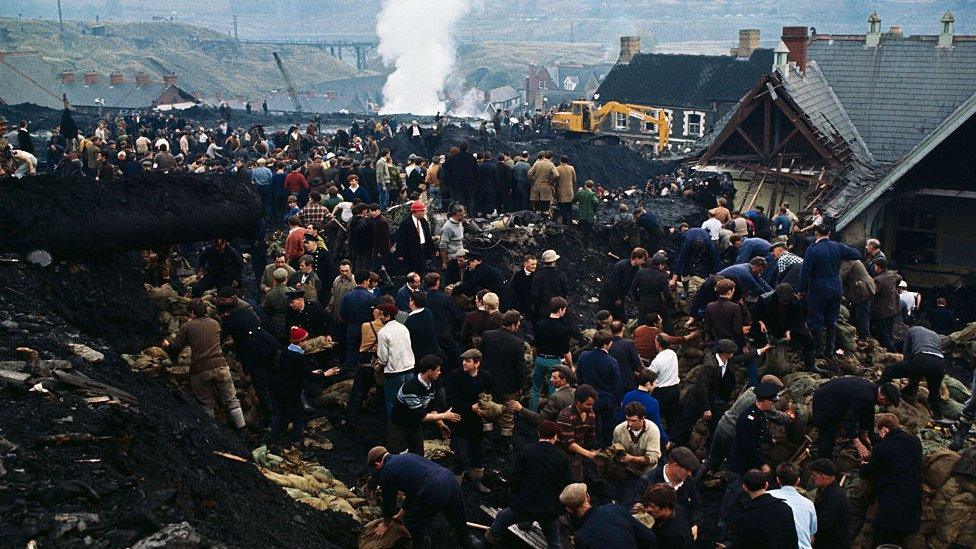
116 children and 28 adults were killed when a colliery spoil tip collapsed in Aberfan in 1966
The Welsh government has previously asked Westminster for financial help to make coal tips safe in the long-term.
Ministers in Wales believe around £600 million will be needed to help protect the tips from the impact of climate change over the next 10 to 15 years.
Research after the Tylorstown landslide suggested the amount of rain falling on the south Wales coalfields had increased by 13% since the 1960s.
Jacqueline Mynott, who heads up the Coal Tip Safety Team at Rhondda Cynon Taf council, said work was being prioritised in order to keep "communities as safe as possible", with those tips with greatest potential risk being looked at first.
'Mammoth undertaking'
Many of the 340 total coal tips in her patch are under private ownership, which can cause complications.
Ms Mynott said there were some "unfortunate situations" where people had been unaware they owned a coal tip until being contacted, sometimes because they had inherited the land after the death of a family member.
The Welsh government said it had made £44m available to help fund any work required, including for privately owned tips.
Wales' Climate Change Minister Julie James called it a "mammoth undertaking" to record and categorise all disused coal tips in Wales into a single central database for the first time.

ONE MAN AND HIS ISLAND: What's life like for Flat Holm Island’s newest warden?
YR WYDDFA: Life on Britain's busiest mountain

Related topics
- Published15 October 2021
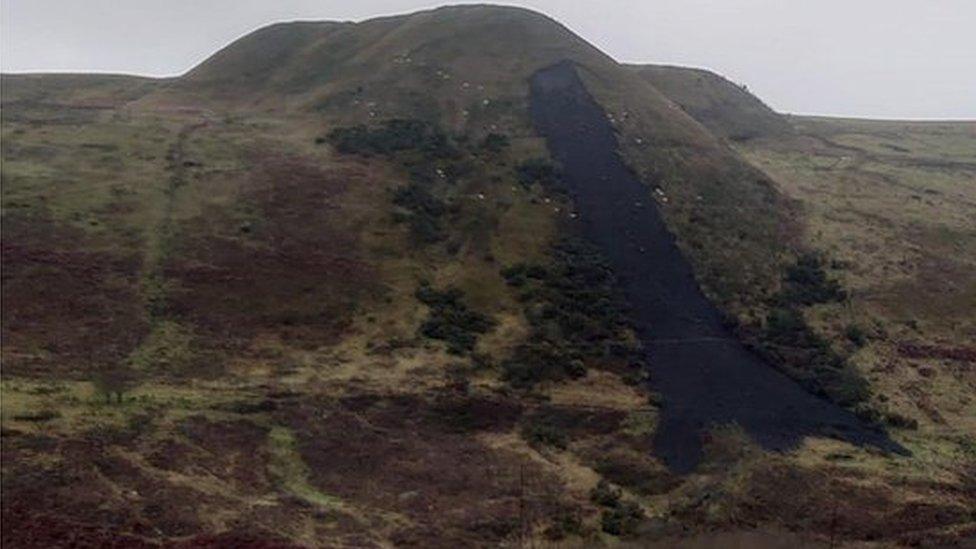
- Published5 November 2021
